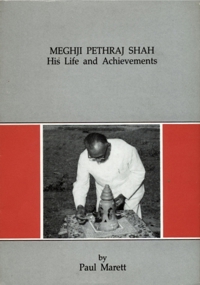
A major project, which Meghjibhai would surely have approved, was the M.P. Shah All India Talking Book Centre in Bombay. The blind cannot see, but they can hear. Modern audio reading equipment has made it possible for blind people to have available to them books of all kinds, from light fiction to university level textbooks in economics, history, law or many other subjects. The talking book project in Bombay was started in 1964 by Dr. Rajendra T. Vyas (who is himself blind), who is now Asia Director of the Royal Commonwealth Society for the Blind. At that time there was a single small recording studio at the blind workshop in Bombay. It was flooded with requests and could not cope with them with the existing facilities. In due course the government gave a good site facing the sea on what is now Khan Abdul Ghaffar Khan Road. An architect was engaged and plans were drawn up. The estimated cost was four and a half million rupees.
It would be necessary to have at least half of that in hand before work could be started on the building. Various donors were approached and small sums of money trickled in. Then Mr. Dilip Mehta, a friend of Meghjibhai' s family, an elderly man and nearly blind himself, who used the talking book facilities came one day to exchange his cassettes and suggested to Mrs. Freny Gagrat, the Honorary Secretary, that she should approach the M.P. Shah Charitable Foundation. He also wrote a letter himself. This was in July 1980. The Trustees' decision was not made without due consideration but the donation made was generous: 1.8 million rupees, or in sterling? 110.000.
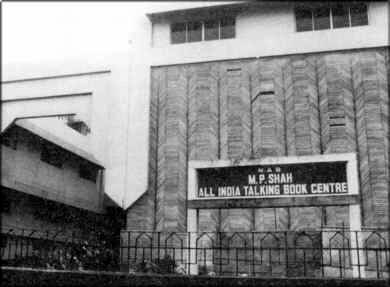
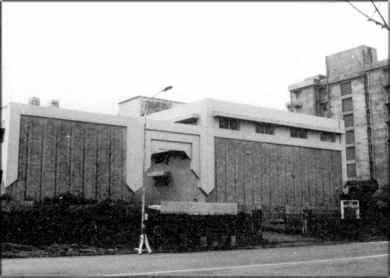
As had been the experience of Meghjibhai himself, once the fund was really under way, and the respected name of M.P. Shah was attached to the project, donations snowballed and the government also gave a grant. The M.P. Shah All India Talking Book Centre became fully operational in 1986 and was formally inaugurated by the former President of India, Zail Singh, in 1987. Now the Centre 'publishes' over a hundred titles a year, which are recorded by expert readers who are mostly volunteers. Books recorded are in eight Indian languages (and English) and a monthly sound magazine is published in Hindi, Gujarati and Marathi, as well as English. There are three fully soundproofed studios and sophisticated modern recording and tape copying equipment. Cassettes are sent to most parts of India, as well as to South Africa and the United Kingdom for the benefit of Indian residents there. This project exhibits all the characteristics of Meghjibhai' s own donations: a substantial sum, paid quickly without argument, associated with his highly-respected name to encourage other donors, and benefit to a wide section of the people rather than to a single narrow community. Undoubtedly, Meghjibhai would be proud to see such use being made of the money, which he had put in trust for charitable purposes.
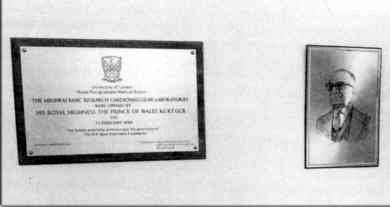
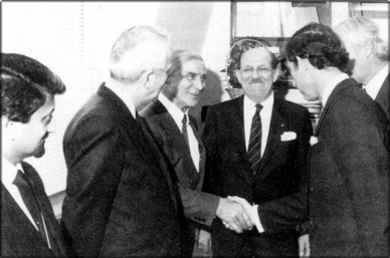
Opening of the Meghraj Basic Research Cardiovascular Laboratories, at Hammersmith Hospital, London, by H.R.H. Prince Charles.
In London the excellent work of the Royal Postgraduate Medical School at Hammersmith Hospital was recognised in 1968 by a donation of? 20, 000 from the Trust for the Meghraj Lecture Theatre and Consulting Rooms. A further donation of? 80, 000 has now been made and was utilised to construct The Meghraj Basic Research Cardiovascular Laboratories, which will be used to conduct further research on the causes of heart attacks. The new unit was formally opened by H.R.H. Prince Charles on 25th February 1988. In Leicester a most generous donation of? 50, 000 has gone to the Jain Centre for the Maniben M.P. Shah Hall. By his own efforts and dedication Meghjibhai, who started his career as an ordinary man, rose to be a great institution. Some rare people have a personality so auspicious and remarkable that they create a special atmosphere around them and whoever enters that atmosphere experiences a special kind of splendour and is blessed by simple contact with them. Meghjibhai was one such. From the very beginning his genius was creative. Throughout his life he loved and sought to benefit his fellow human beings. He was a man of creative vision, a man with a firm faith in God and a conviction that others would be willing to co-operate in good deeds. He was always ready to accept a challenge to create something out of nothing. The fame, which he achieved in business, in trade, in social service, politics and other fields, was due to his sense of duty, his sincerity and his commitment to the service of society. Meghjibhai showed that men of business need not be self-seeking, that there is another direction. The acquisition and accumulation of wealth alone cannot make for personal happiness. Wealth accumulated for the sake of personal comfort is a snare and a delusion, binding men ever more securely to its further accumulation. Wealth retains its lustre only when used for public benefit: when simply accumulated it tarnishes and rusts.
His two sons, Vipin and Anant, have established a banking business in the British Isles, which had been the heartfelt desire of Meghjibhai, even going back to Kenya in the mid-1940's. In fact, certain preliminary steps had been taken but his sudden death in July 1964 put a stop to that and there was a vacuum until the sons grew up. In the inheritance received by the two sons of Meghjibhai, the most precious one was the family' s prestige and reputation, which their father had built up during his lifetime. It is because of the trust people placed in him and his family that the present business is flourishing. For obvious sentimental reasons the sons have given the business the name 'Meghraj' which is derived from Meghjibhai's two names, Meghji Pethraj.
Many people are concerned with good thoughts, high principles, cultured attitudes and noble ideas. But Meghjibhai unselfishly and unceasingly put them into practice and provided for all time a noble example to the whole of human society. Great men become great not by virtue of their mere ideals but by virtue of their conduct. Meghjibhai has left that memory of his noble deeds, which will be revered in future years and will inspire many generations to come. We shall not see his like again for a long, long time.
'I shall pass through this world but once. If, therefore, there be any kindness I can show, or any good thing I can do, let me do it now: let me not defer it or neglect it, for I shall not pass this way again.'
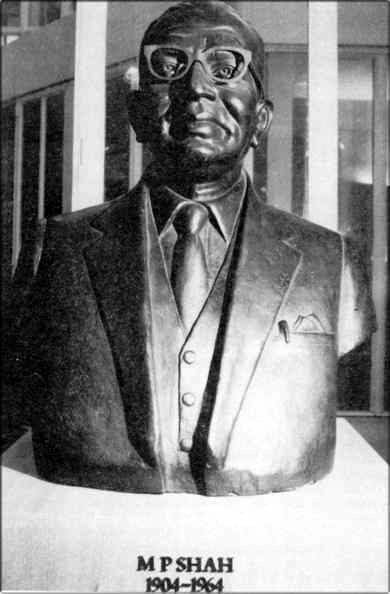
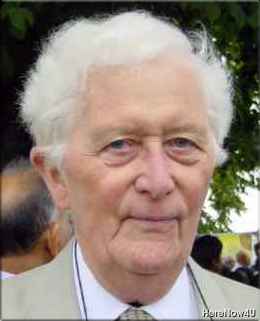 Dr. Paul Marett
Dr. Paul Marett

